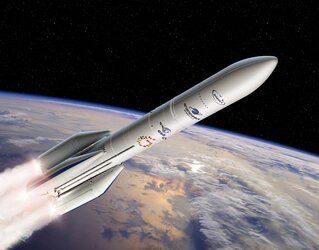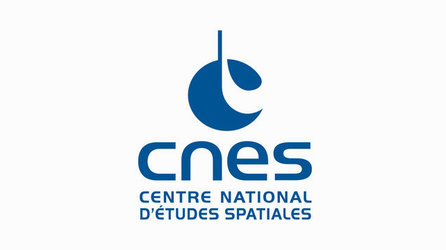First rollout of Ariane 6 mobile gantry
At Europe’s Spaceport the Ariane 6 mobile gantry, a 90 metre-high metallic structure built to house Ariane 6 underwent a 97 m rollout test last week to mimic prelaunch.
When fully equipped, this mobile gantry will weigh 8200 tonnes – more than a thousand tonnes heavier than France's Eiffel Tower. Its platforms provide access to the launch vehicle for integration on the launch pad. It protects Ariane 6 until its doors are opened and it is retracted about five hours before the launch.

The mobile gantry stands on 16 bogies, each bogie comprises eight wheels and each wheel is equipped with one electric motor. A total of 128 electric motors synchronise to set the wheels in motion along rails.
“Preparation is everything but the actual move is automated and quite simple,” explained Jean-Michel Rizzi, ESA’s Ariane 6 Launch Base Project Manager, “You choose to move the gantry forward or backwards and then press the start button.

“There are three speeds. The first and last metre are done at the slowest speed of a metre per minute. This increases to a ‘cruising’ speed of 7.6 m per minute for a 130 m stretch and then slowed back down to 3 m per minute in the decelerating phase over a distance of 9 m. The full rollout of 141 m takes 22 minutes.”
Over the next five weeks this test will be repeated several times and after each test, the mobile gantry will be rolled back to its initial pulled back position.
Current works being carried out around the nearby mast will soon be finished allowing the mobile gantry to follow the full track length.
Engineers will measure speed, the profile of electrical power being drawn during the rollouts, and the synchronisation of all 128 motors.
The Ariane 6 Launch Base construction is nearly complete and final tests are proving the infrastructures are ready for handover from industry to CNES, France’s Space Agency. These rollouts are part of this process. At the end of this year all systems are expected to be fully integrated.
After a successful Launch Base Technical Qualification Review, CNES will hand over the launch base to ESA.















 Germany
Germany
 Austria
Austria
 Belgium
Belgium
 Denmark
Denmark
 Spain
Spain
 Estonia
Estonia
 Finland
Finland
 France
France
 Greece
Greece
 Hungary
Hungary
 Ireland
Ireland
 Italy
Italy
 Luxembourg
Luxembourg
 Norway
Norway
 The Netherlands
The Netherlands
 Poland
Poland
 Portugal
Portugal
 Czechia
Czechia
 Romania
Romania
 United Kingdom
United Kingdom
 Slovenia
Slovenia
 Sweden
Sweden
 Switzerland
Switzerland




























